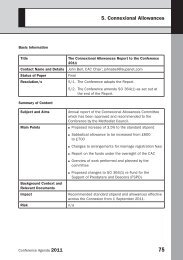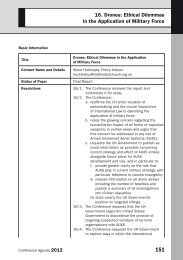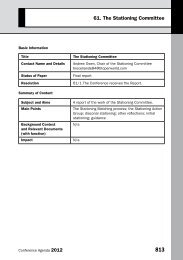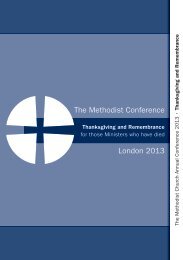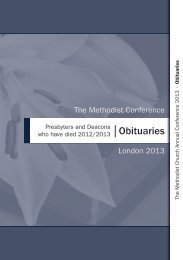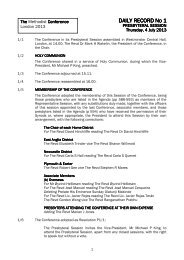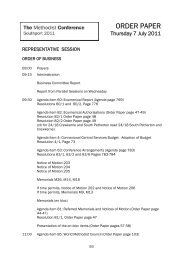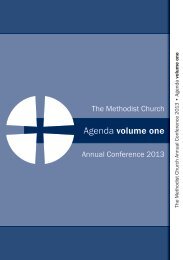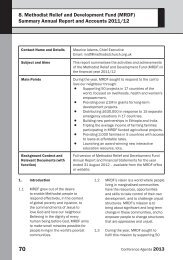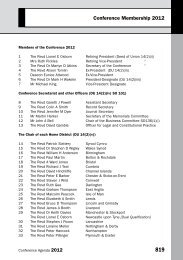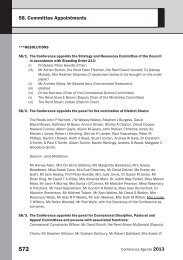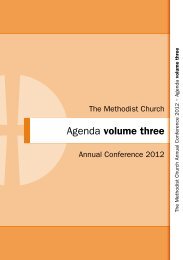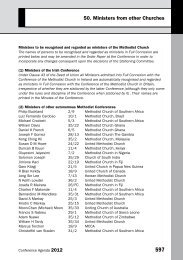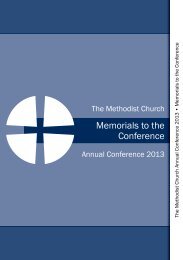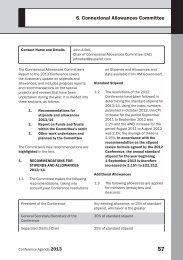Agenda Volume 2 - Methodist Conference
Agenda Volume 2 - Methodist Conference
Agenda Volume 2 - Methodist Conference
Create successful ePaper yourself
Turn your PDF publications into a flip-book with our unique Google optimized e-Paper software.
41. The Discipleship and Ministries Learning Network<br />
breadth of their impact on the life<br />
of the Church, the reliance of such<br />
relationships on local contextual<br />
factors and the longer term viability<br />
of those relationships. A long list<br />
of these relationships is therefore<br />
being drawn up by members of the<br />
IMT and the Connexional Team and<br />
in our current learning institutions.<br />
This list is being shared regularly<br />
with members of the Implementation<br />
Executive (IE), who are providing<br />
comment and feedback as<br />
necessary. Details about specific<br />
configurations and locations of<br />
relationships are being explored<br />
under the categories:<br />
●●<br />
●●<br />
●●<br />
●●<br />
●●<br />
●●<br />
●●<br />
●●<br />
Validation Relationships<br />
Provision of teaching or<br />
research training/oversight<br />
Provision of a broader<br />
intellectual community within<br />
which <strong>Methodist</strong> students can<br />
work<br />
Provision of office and learning<br />
spaces and physical resources<br />
Provision of specialist technical<br />
services<br />
Church influence within the<br />
context of an HEI and HE more<br />
generally<br />
Research or Study ‘Centres’,<br />
Fellowships or Chairs<br />
Exchange Programmes.<br />
5.10 Ongoing work to maintain and<br />
develop these types of relationship<br />
where they currently exist and add<br />
demonstrable value to the Church<br />
Working from this list of the types of<br />
relationship that can exist, members<br />
of the IMT, the Implementation<br />
Executive and the Connexional Team<br />
have begun a process of targeted<br />
consultation to explore where and<br />
with whom some of these might<br />
possibly be pursued within the<br />
future life of the DMLN. This is a<br />
sensitive and complex task that<br />
will evolve creatively, and which<br />
is also impacted on by external<br />
factors (such as the Common<br />
Awards partnership with the Church<br />
of England), but has at its core a<br />
commitment to:<br />
●●<br />
●●<br />
●●<br />
●●<br />
speaking with key<br />
representatives from all our<br />
existing learning institutions<br />
and working with them to<br />
identify their own ideas about<br />
the possibilities of future<br />
relationships between their<br />
partner HEIs and the <strong>Methodist</strong><br />
Church;<br />
speaking with key<br />
representatives from all of<br />
those partner HEIs where,<br />
through our own learning<br />
institution contacts or through<br />
other means, the possibility of<br />
fruitful interaction in the future<br />
seems realistic;<br />
ensuring that the DMLN is<br />
fully informed about how<br />
relationships with current<br />
HEI partners can be well and<br />
best managed as they either<br />
come to a close or evolve into<br />
something new;<br />
speaking with a range<br />
of <strong>Methodist</strong>s involved,<br />
through work outside of the<br />
<strong>Conference</strong> <strong>Agenda</strong> 2013<br />
467



